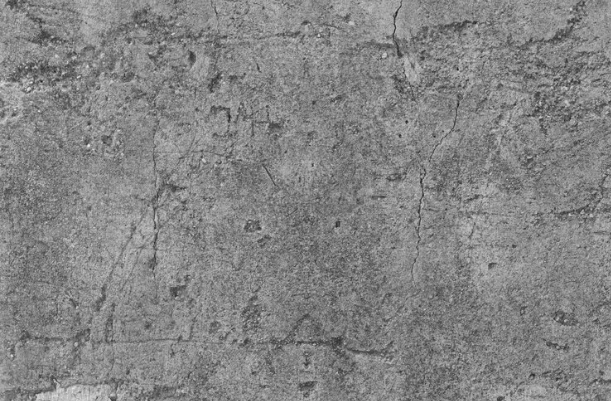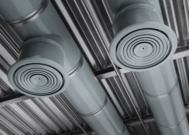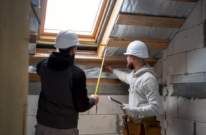Concrete Densifier vs Sealer: What are the Differences?


Roger Marx
Roger Marx, a distinguished BPA Advisor specializing in Landscaping & Outdoor Materials, is dedicated to sharing his extensive knowledge and expertise on the latest trending building and design products. With a keen focus on landscaping and outdoor materials, Roger contributes valuable insights that shape discussions on innovative construction practices and materials in these vibrant and essential areas.
A nicely finished concrete floor must go through a somewhat laborious process to get the desired result. Before a floor is suitable for use, concrete must undergo chemical alterations from the pour to the finish. On decorative concrete floors, densifiers and sealers are used at various stages and for various objectives. Below, we'll break down the differences between a concrete densifier vs sealer and advise you on practical applications.
What is a Concrete Densifier?
A densifier is a chemical hardener that is often put on top of the concrete slab after installation and is utilized during the refinement phase if polishing the slab. Using a densifier is a cost-effective approach to increase a concrete slab's strength, endurance, and longevity, whether the slab is polished or left unpolished.
Concrete densifiers boost the concrete slab's surface density and serve as a pore filler. Applying the densifier causes a chemical reaction that fills every pore with a byproduct that is absorbed deeply into the concrete slab.
This approach reduces pitting while also hardening the concrete surface. It greatly increases surface durability compared to concrete surfaces without a densifier treatment.
Why is it Important?
Concrete slabs create a byproduct called free lime throughout the curing process. Calcium carbonate, the "dusting," can make concrete stronger when it interacts with the concrete densifier. Concrete slabs are naturally porous; therefore, applying a densifier to make them less porous and generally stronger as a finished floor surface is a terrific idea.
A calcium-silicate-hydrate gel is created when the concrete densifier interacts with the free lime. This gel creates a continuous layer and is hard and dense. The slab becomes stronger and more resistant to wear than before treatment due to the chemical reaction created when the concrete and densifier are bound together.
Polished concrete is preferred for many structures, including factories and other facilities. Concrete densifiers are the perfect complement for polished floor surfaces in a number of contexts, including stadiums, hospitals, government buildings, airports, factories, and even homes, thanks to their strength-building and wear resistance. The completed floor's resistance to moisture, chemicals, oil, grease, and abrasion is improved by including this inexpensive stage in the refinement process. Light reflection rises and wear from foot or vehicle traffic takes much longer to manifest.
What is a Concrete Sealer?
Concrete is coated with sealers to guard against surface deterioration, corrosion, and discoloration. They either create an impermeable layer that blocks the passage of materials or seal the pores in the concrete, reducing the absorption of water and salts.
In the past, concrete has been sealed with anything from wax to linseed oil in an effort to protect it. Topical sealers and penetrating sealers are the two primary categories of sealers. Topical sealers can offer visual improvement in addition to topical stain and chemical protection. The surface must be dry and clean for them to adhere during application. On the other hand, penetrating sealers can be applied to damp or dry surfaces and should be adequately matched with the substrate porosity.
Why is it Important?
Despite being sturdy and long-lasting, concrete is permeable and prone to cracking. Concrete can deteriorate as a result of weather or sun damage. Even though it could last for centuries, it will weaken and break if it isn't taken care of. Water penetration, a primary source of concrete degradation, is prevented by sealers by forming a solid moisture barrier.
Applying a sealer as soon as the concrete is completed curing is the best approach to protect it. Your concrete will be more prone to costly and avoidable damage if it isn't sealed. Applying a sealant every few years is much less expensive and more convenient than trying to fix a broken patio.
Densifier vs. Sealer: Key Differences
Both concrete sealers and densifiers provide concrete with additional protection. But let's explore the keys to making your decision – the five differences between the two materials.
Reaction
Concrete densifiers have a chemical reaction with the cement and lime in the concrete which causes the top layers to harden and the pores to close up. It is a key distinction between concrete densifiers and concrete sealers.
A concrete densifier works by initiating a chemical process that makes the concrete's top layers harder and denser.
Concrete sealers, on the other hand, don't cause any sort of chemical reaction. Concrete sealants build a barrier or film on top of the concrete rather than soaking in and igniting a chemical reaction. Sealants for concrete only rest on top of the surface.
Durability
Concrete can already support high levels of weight on its own. The important thing to remember is that concrete densifiers do, in fact, make concrete denser, which increases its resistance to pressure and weight. On the other hand, concrete sealer does not perform as well in weight-bearing applications since it does not make concrete denser or firmer.
In contrast to concrete sealer, which merely provides a protective layer on top, concrete densifier really makes concrete tougher, denser, and stronger.
Longevity
The fact that concrete sealer will probably need to be applied again every few years is another significant distinction between concrete sealer and concrete densifier. Concrete sealer can wear down and chip away over time because it creates a layer or membrane on top of the concrete.
Contrarily, a concrete densifier causes a chemical reaction with the top layers of concrete, making the effect exceedingly persistent and irreversible. In other words, concrete densifier has a significantly longer shelf life and does not require reapplication.
Protection
Concrete densifier does give additional protection for the concrete, especially when compared to simple concrete sealer because it causes a chemical reaction that really alters the structure of the top layers of the concrete.
While sealer is great for creating a protective membrane that can help against moisture damage and physical damage, it is not always the ideal choice, especially when compared to concrete densifier. Concrete sealers can wear away over time, but densifiers won't due to the chemical changes they create in the concrete.
Aesthetic
The use of concrete densifiers indoors, where excellent visual appeal is required, is not recommended because they do not alter the overall appearance of the concrete.
On the other hand, there are many various types of concrete sealers available, so you may get the exact look you want. They can change the appearance of the concrete and are available in a range of hues and textures. Densifiers will not change the aesthetics of the concrete flooring.
Should I use a Concrete Densifier vs Sealer?
What your main goal is is what it actually all boils down to.
A concrete densifier is the best option to choose if you want the highest level of protection, especially if the surface is outside. However, concrete sealer is the way to go if you only want to protect your concrete and it is for interior uses, particularly if you want an exceptional aesthetic appeal.
However, you don't always have to choose! There are combination products like Prosoc's LS, which is a sealer, hardener, and densifier.
LS is a premium concrete flooring product that can be used on new or old concrete to enhance performance, appearance, and light reflectance. Treated surfaces resist damage — whether from water invasion or surface abrasion — and are easy to maintain. They also do not require waxing. The increased surface hardness imparted by LS eliminates dusting and simplifies maintenance, producing a cleaner, healthier environment.
Get Smarter About Building Products
Join 50,000+ subscribers and get our 3 min daily newsletter on what matters in the building materials industry.
You might like this


Solving Ventilation Challenges: Metal Deck Profiles and Back Draft Dampers as Key Solutions
When it comes to building design and construction, ventilation is a critical factor that often presents significant challenges. Proper ventilation is essential for maintaining indoor air quality, controlling temperature, and ensuring occupant comfort and safety. In this article, we will explore how metal deck profiles and back draft dampers are key solutions for addressing ventilation […]


The Ultimate Guide to Home Insulation
When it comes to creating a comfortable and energy-efficient home, insulation plays a pivotal role. Proper insulation helps regulate indoor temperatures, reduces energy consumption, and enhances overall comfort. In this comprehensive guide, we’ll explore various aspects of home insulation, including the best types of insulation for different areas of your home and key considerations for […]


The Best Hidden Deck Fasteners: Concealed Elegance and Lasting Stability
Decks, those quintessential outdoor havens, serve as extensions of our living spaces, inviting us to bask in the open air. But what if we could take this experience to the next level? Enter concealed deck fasteners, the unsung heroes that elevate your deck’s appearance and structural integrity, all while keeping their existence a secret. In […]